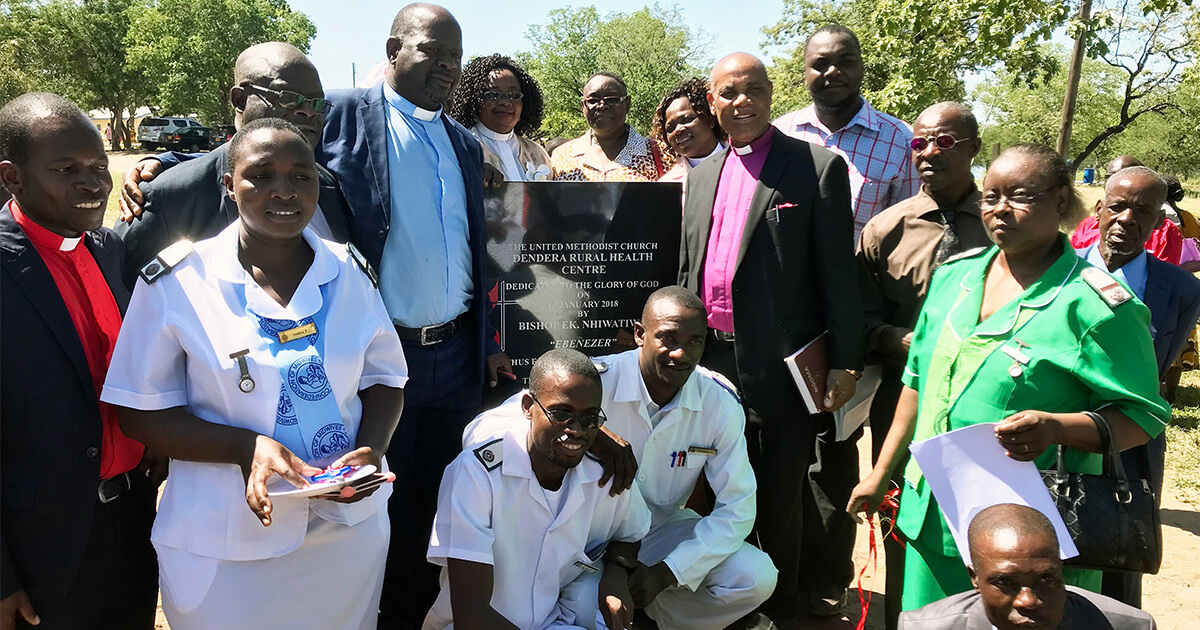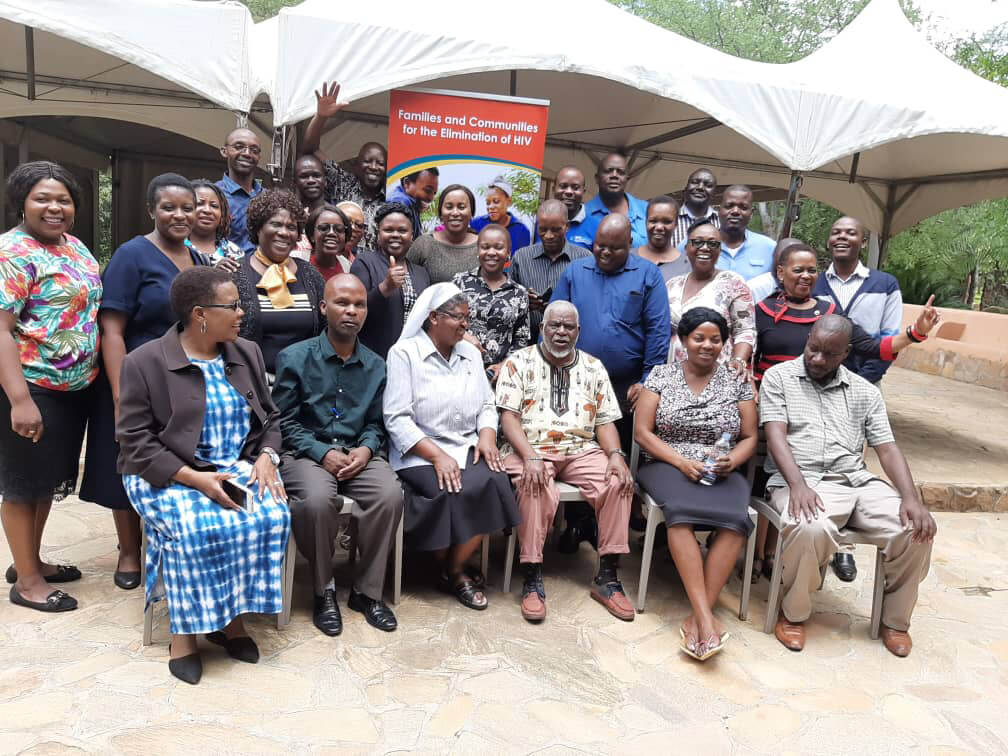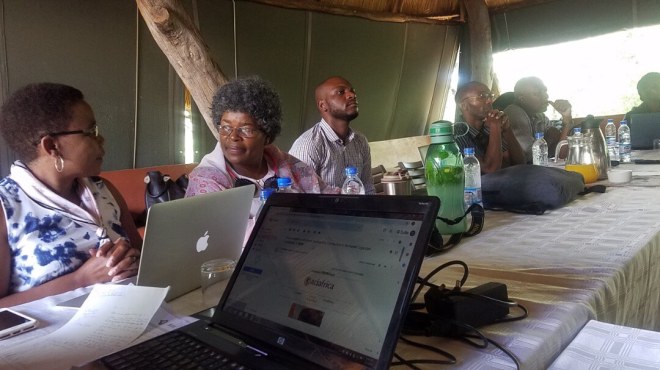
An interview with Hannah S. Mafunda, Health Coordinator, Zimbabwe Episcopal Area Health Board
By Christie R. House
June 2020 | ATLANTA
I want to respond to the novel coronavirus in a meaningful way – not being emotional, not rushing in. Whatever our response, whether trainings or equipment, I want it to last. We want to do something that will really make a difference.
– Hannah S. Mafunda
Hannah Mafunda understands fine lines and how to walk them, managing multiple projects to meet the health needs of Zimbabweans seeking care from United Methodist health facilities. Mafunda is the health coordinator for the Zimbabwe Episcopal Area Health Board, which oversees the health work of two annual conferences, three hospitals and 12 rural health centers. Her work often requires her to coordinate projects with the Zimbabwe Ministry of Health and Child Care, the Global Health unit of the United Methodist mission agency and international health organizations seeking partnership.
But Mafunda doesn’t walk this fine line alone. She’s accompanied by faith-based friends who form a coalition across religious communities to make the most of Zimbabwe’s health resources.
In mid-May, Mafunda was on her way to a World Health Organization COVID-19 training in Harare with some of her Catholic counterparts. Zimbabwe has restricted movement and public gatherings in response to COVID-19, but currently allows essential meetings if social-distancing and facemask guidelines are followed.
“I attended with ladies from the Catholic Bishops Conference. We talked after the training and determined what we could change, together, to better prepare for cases of COVID-19,” said Mafunda.

PHOTO: OPHID
Faith-based networks in Zimbabwe
The United Methodist Church is a member of the Zimbabwe Council of Churches, a council of 26 Protestant denominations and another 10 affiliate members. In turn, the Zimbabwe Council of Churches is one of four main church bodies that form an umbrella of faith-based organizations called the Zimbabwe Heads of Christian Denominations (ZHOCD). The other three members are the Union of Development for Apostolic Churches in Zimbabwe and Africa, the Zimbabwe Catholic Bishops Conference and the Evangelical Fellowship of Zimbabwe.
Among ZHOCD churches, The United Methodist Church and the Catholic Bishops Conference have the largest networks of mission and church-based health facilities. According to Mafunda, churches in Zimbabwe provide 65% of health care services in rural areas and 35% nationally.
Currently, ZHOCD members are in the middle of a two-year action plan for HIV and AIDS in partnership with UNAIDS, the Zimbabwe National AIDS Council and the Zimbabwe Ministry of Health and Child Care. They seek to improve coordination and reporting mechanisms among their faith-based health facilities, hold awareness campaigns and teach prevention and treatment options, among other actions. They have also participated in the U.S. President’s Emergency Plan for AIDS Relief (PEPFAR) and a Stop TB (tuberculosis) initiative, with primary leadership from the Zimbabwe Council of Churches. These same interfaith networks are invaluable in facing the challenges of the COVID-19.
Tapping into the experience of others
At home, among United Methodist colleagues, Mafunda also walks with friends. The United Methodist Episcopal Health Board promotes health and community development work within United Methodist Church structures. Its members include medical, business and legal personnel as well as community leaders and church members.
“The primary task of the board is to ensure provision of holistic, affordable and accessible health care services through the various programs to the communities,” Mafunda explained. “The board has, through the church, well-defined structures that make implementation of programs easy.”
ZHOCD’s health coordinators met together to discuss strategies, sharing best practices as well as gaps in COVID-19 interventions in health facilities and community engagement. At one of the meetings, Mafunda and the Catholic Bishops Conference national health coordinator shared notes on the needs of facilities in the two denominations. This allowed them to draw up a refined list of equipment needs based on the capacities of their combined facilities: oximeters, for monitoring pulse and oxygen saturation levels, monitors for vital signs and oxygen concentrators, which draw oxygen from the air and can be plugged into solar power units.

Photo: OPHID.
Mafunda said that if she and her colleagues had rushed to use their slim resources to acquire ventilators, as many recommended early on, they would have wasted staff time and money. Patients on ventilators must be constantly monitored. Most of the health facilities do not have the capacity to manage intubated patients in intensive care.
Continuing her walk in her “many partnered” world, Mafunda recognizes the invaluable assistance of a U.S. coalition of United Methodist churches called the Nyadire Connection. In the past eight years, these church partners in the Western Pennsylvania Annual Conference have funded the upgrading of three rural health centers within the Zimbabwe West Annual Conference and are currently working on a fourth, contributing a total of over $1.2 million.
“The church has been walking in the Jesus manifesto through women in ecumenical worship and through mission hospitals,” Mafunda said. “The ministry embraces a holistic vision of healing that goes beyond providing high-quality medical care to caring for people in mind, body and spirit and promoting the well-being of communities.”
Nyadire Hospital can also be supported by giving through Advance # 3022276, for Nyadire mission hospital renovations.
Christie R. House is a consultant writer and editor with Global Ministries.

